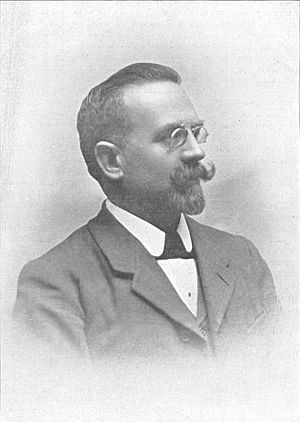Antoni Rubió i Lluch facts for kids
Antoni Rubió i Lluch (born in Valladolid in 1856, died in Barcelona in 1937) was an important Spanish historian and thinker. He was also a proud Catalan, inspired by the Catalan Renaissance, a time of renewed interest in Catalan culture. He was an expert in ancient Greek culture (a Hellenist) and the Middle Ages (a medievalist). He is especially known for his studies on how Catalans influenced Greece in the 1300s.
Contents
A Life Dedicated to Learning
Antoni Rubió i Lluch was the son of a poet, Joaquim Rubió i Ors. He studied philosophy and literature at the University of Barcelona. There, he learned from famous teachers like Manuel Milà i Fontanals. He also became good friends with Marcelino Menéndez y Pelayo, another important scholar. Both were key figures in a way of thinking called "positivism," which focused on facts and science.
Early Career and Teaching
In 1880, Rubió i Lluch started as a tutor at the University of Barcelona. By 1885, he became a full professor of general literature at the University of Oviedo. Soon after, he moved back to Barcelona to teach. In 1889, he joined the Reial Acadèmia de Bones Lletres de Barcelona, a royal academy for literature.
In 1904, he began teaching Catalan literature at the Estudis Universitaris Catalans. Two years later, in 1906, he was the vice-president of the First International Congress of the Catalan Language. This was a very important event for the Catalan language.
Leading Catalan Institutions
The next year, in 1907, he became a member and the first president of the Institute for Catalan Studies. This institute helps promote Catalan language and culture. He also led the Jocs Florals in Barcelona. These were poetry contests that celebrated Catalan culture.
Supporting Greece
Rubió i Lluch also cared deeply about politics. He supported Greece's wish for Crete to be part of Greece. In 1897, he wrote a public statement supporting the Greek cause. This was done on behalf of many Catalan groups. Because of his efforts, he was made an honorary Greek consul in Barcelona for eight years. He also received a special Greek award called "Knight of the Order of the Saviour." He became an honorary member of the Parnassos Literary Society in Greece.
Other Important Roles
He was also a member of the Reial Acadèmia Catalana de Belles Arts de Sant Jordi, an academy for fine arts. He worked with the Academia de la Historia de Madrid and the Academia Española (from 1930). He even served as president of the Centre Excursionista de Catalunya, a hiking and exploration club.
His Influence and Works
One of his notable students was Ángel Valbuena Prat. Rubió i Lluch believed that Catalan became an independent language around 1326. He edited important documents for his work Historia de la cultura Catalana Mitgeval (1908). He also edited Curial y Güelfa, a Catalan novel from the 1400s. He translated Greek novels into Spanish as well.
See also
 In Spanish: Antonio Rubió y Lluch para niños
In Spanish: Antonio Rubió y Lluch para niños
 | Bayard Rustin |
 | Jeannette Carter |
 | Jeremiah A. Brown |


